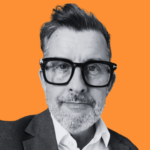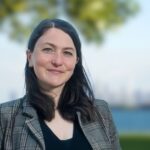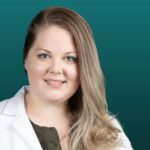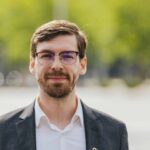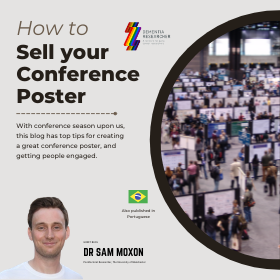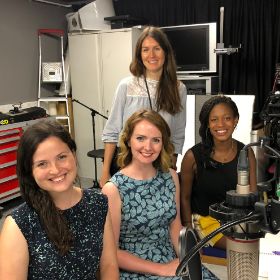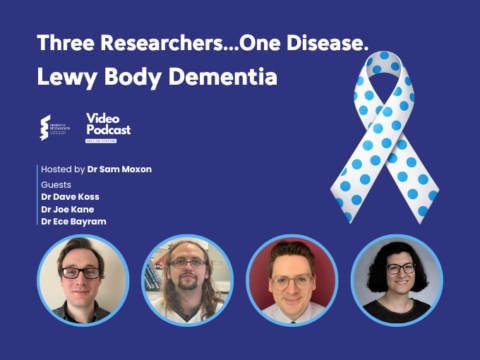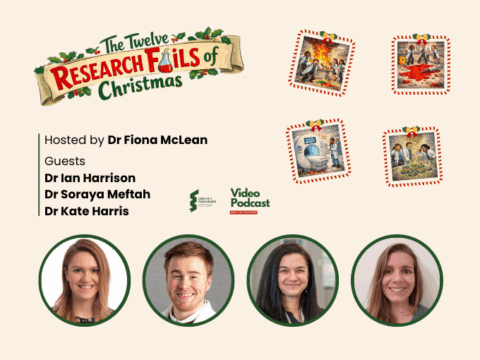In this podcast we learn what to expect from the upcoming AAIC Neuroscience Next Conference, a global, no-cost event that aims to support and showcase the next generation of Alzheimer’s and dementia researchers and clinicians.
Adam Smith, Dementia Researcher Programme Director is join by some of the people behind making it all happen.
Dr Igor Fontana, Alzheimer’s Association Director, Scientific Conference Programming. Dr Francesca Farina, Assistant Professor at the University of Chicago and Global Brain Health Institute at Trinity College Dublin, and Dr Kaitlin Seibert, Assistant Professor of Neurology also at University of Chicago.
This unique conference works on an innovative "hybrid hub" format that connects both global and local communities. With elements being in-person and online, and full in-person from hubs in the USA, Ireland, India, Ethiopia, Brazil and Serbia.
Voice Over:
The Dementia Researcher Podcast, talking careers, research, conference highlights, and so much more.
Adam Smith:
In this podcast, we're going to get the lowdown on what you can expect from the 2024 AAIC Neuroscience Next Conference, a massive free event taking place from the 22nd to the 25th of April.
Hello, I'm Adam Smith. I'm the programme director for Dementia Researcher and I'll be your host for this podcast. Usually at this point I would do a fun little summary of the topic, but if I do that today, I suspect I will steal the thunder of my three brilliant guests. So instead, let's just skip straight to the introductions. I'm delighted to be joined by three people who have been working incredibly hard to make this event happen, and they're going to tell us all about what we can expect. And by the end of the show, I hope you'll be inspired to go and register, attend, and get involved. It's my pleasure to introduce Dr Igor Fontana, Dr Francesca Farina, and Dr Kaitlin Seibert. Hello everybody.
Dr Francesca Farina:
Hello.
Dr Igor Fontana:
Hello.
Dr Kaitlin Seibert:
Hi Adam. How are you?
Adam Smith:
Fantastic. Now you're all new to the podcast, this is quite rare. Quite often these days, mostly the people have had... At least one of the guests have been here before, but you're all new. So, thank you so much for joining. And of course, I should say that means everybody who comes on our podcast of course has their bio on the website. So now if you go to our webpage, you'll be able to find out all about our guests and read their bios on their website, including things like what books they're reading, their playlists. Have you all given me a playlist? We are adding these to the website as we speak, so what music they listen to, what they do to wind down. However, don't go reading just yet. Let's hear from them all to get a proper introduction. Igor, why don't you go first?
Dr Igor Fontana:
Thank you so much for having us today, Adam. It's a big pleasure. My name is Igor Camargo Fontana. I am the director of Scientific Conference Programming with the Alzheimer's Association. My main focus is to really be highlighting the beautiful research in Alzheimer's and dementia all over the world.
Adam Smith:
I can't believe you've not been on the podcast before because we've met so many times. Why has it taken us so long to have you on the podcast? So, you must be one of the busiest people at the Alzheimer's Association because you've got the most conferences of any charity I know. You've just come back from Tau, right?
Dr Igor Fontana:
Correct.
Adam Smith:
You've got the Latinos Conference. Is that now or just about to happen?
Dr Igor Fontana:
Yes. Next week we're going to go to San Diego, April 4th and 5th. So, it's nonstop indeed.
Adam Smith:
And then AAIC of course, which is the big one. And you've also got the satellite symposium in May as well. Wow. Well, brilliant. Thank you so much for finding time to get to us. I'm going to go to Francesca next.
Dr Francesca Farina:
As Igor said, it's a real pleasure to be on the podcast, longtime listener, so it's exciting. And my favourite thing about Igor is when he describes his conferences, he always says, "The small ones" and it's still like thousands of people. So, it's lovely to be here. My name is Francesca. I'm a research assistant professor in the School of Medicine at the University of Chicago as of a few weeks ago. And I'm also an Atlantic Fellow for Equity in Brain Health with the Global Brain Health Institute at Trinity College in Dublin, which is how I ended up being a co-host for the Ireland Neuroscience Next Hub.
Adam Smith:
Wonderful. Well congratulations on your new job. Is that new as in literally you've just moved to Chicago?
Dr Francesca Farina:
I was at Northwestern University, also in Chicago, right before, but I started at University of Chicago 1st of March.
Adam Smith:
Well, congratulations. What does your research focus on?
Dr Francesca Farina:
My research focuses on life course risk reduction. So, primarily midlife risk factors in specific groups like higher risk women, for example. People with a family history, people who are particularly anxious about dementia and that might influence their help seeking behaviours. And I also co-lead the Next Generation Study, which is a brain health study focusing on younger adults looking at do younger adults even think about their own brain health? Do they connect that to things like Alzheimer's and dementia and what is their risk exposure at that young stage before we even get to midlife?
Adam Smith:
Wonderful. That's so important and such a hot topic right now. I haven't been to a conference in the last two years that hasn't had a substantial chunk on dementia prevention. Because of course, that's the future, right? Well, fantastic. Thank you very much for joining us. Kaitlin, why don't you go next?
Dr Kaitlin Seibert:
Thanks, Adam. It's a real pleasure to be here. I really appreciate it. So, I'm a behavioural neurologist at University of Chicago, so I spend most of my time seeing patients and focusing on accessibility barriers, social determinants of health in the south side of Chicago. My research interests include social cognition, trying to identify frontotemporal dementia, other atypical dementias early on as compared to primary psychiatric disorders. And then I also have a special interest in creative arts therapies and therapeutic arts and dementia. Actually, before I became an MD, I was a musician, so I play trumpet. So, it's something that's near and dear to my heart.
Adam Smith:
Oh wow. We just did a podcast the other week on music and dementia and the beneficial points of that. And this week that we had another one, early this week, on the same thing.
Dr Kaitlin Seibert:
That's awesome. I'll have to check them out.
Adam Smith:
So that's also, you've got all the bases covered there. There must be not very many grant applications come up that you can't apply for with that whole range of interests that you got.
Dr Kaitlin Seibert:
Thank you. That's what we aim for. I appreciate that.
Adam Smith:
Well, thank you very much all of you for joining us with the introductions done. Let's get onto hearing about news from the event.
So, Igor, can I maybe come to you first to set the scene and give us a little bit of history about how this event came about and how it's developed over the last few years?
Dr Igor Fontana:
So, AAIC Neuroscience Next, I think is important for us to mention to our listeners what does AAIC stands for. AAIC is the Alzheimer's Association International Conference. And Neuroscience next is really to focus on the early career researchers, the next generations of neuroscientists, especially those interested in Alzheimer's and dementia research. AAIC Neuroscience Next started in 2020 when we were unfortunately hit by the pandemic and by thinking of those students and postdocs that were about to present their research in big conferences and didn't have the chance, of course.
The Alzheimer's Association, led by Dr Claire Sexton, had this idea of providing an opportunity for those to present their research in a conference. So, this was initially only virtual, a virtual conference free of course, totally focused on early career researchers. Now after four years, yes, it's been four years since the pandemic started, we had last year initial attempt a pilot with kind of trying to bring the in-person component to the virtual conference. So, we did a couple of locations in London, in the US, and in Brazil as well. But now this is the first year that we are going to really bring a new concept, the hybrid hub.
Adam Smith:
A hybrid hub. That sounds like more organisation. I remember those early conferences because I was on the organising committee, I think, for the first one. And I think it was quite unique then, this idea of doing an entirely free online conference and it had so many people attend. Does it still, is the focus now... Because at that time I think it was very much that SFN audience and it was very kind of hard neuroscience. Is it the same audience now or has it broadened out to... Because I'm conscious, Kaitlin, Is your work that... You don't work in a lab in the same way, do you? You're clinical.
Dr Kaitlin Seibert:
Right, exactly. So, I'm not basic science based. I'm more clinical science based. My research is more clinical research. So, I'm really excited to be new to the space and I think that we're bringing a lot of folks that are interested in clinical research too.
Adam Smith:
So, who's it for, Igor? Who should be coming to this?
Dr Igor Fontana:
So, as in why, as you mentioned, Adam, at the beginning, we were really focused on basic neuroscience, but now as we are going global, we really want to understand the regional needs for giving the stage to early career researchers. So, we understand that basic neuroscience is not the main focus of research in certain locations. And again, the main focus is early career researchers, PhD students, early postdocs. This is the main goal. Of course, neuroscience is a very big theme of research and of course, Kaitlin can tell more how we can combine things. So basic science is also there to kind of support, as Kaitlin mentioned her subject of research, of how arts can be a way of preventing the development of Alzheimer's and other dementia. And then how can we explain this in mechanisms? So that's when we bring the basic neuroscientists, and we combine everyone together. The main goal here is early career researchers, but people that have the whole broad of Alzheimer's and dementia research.
Adam Smith:
That collaboration, that kind of recognising that people can learn from each other, I think, is important, isn't it? So, it's not just for lab researchers. If you are a psychologist, if you work in the neuroscience dementia space or atypical dementias or in clinically, there'll still be something in this programme for you. It's not just a lab researcher fundamental scientist event. So that's good to clear that up. Now then, let's get into talking a little bit about this, about the format. You mentioned hybrid hubs. So, it's an online conference, but you've got a hybrid hub. So, what is a hybrid hub, Igor?
Dr Igor Fontana:
Hybrid hub is that we aim to combine different locations across the world. Each of these hybrid hubs, they're going to be having onsite events and all of these hubs are going to have one plenary presentation followed by lightning presentation rounds or short presentations from early career researchers who submitted abstracts to the conference. So, one invited plenary speaker and four selected early career researchers abstracts. This is the same programme for all of the hybrid hubs. We will be going live from seven different locations across the world.
Adam Smith:
I will tell you where they are. So, that's Porto Alegre in Brazil, San Francisco and Chicago in the US, Bengaluru (Bangalore) in India, Dublin, Ireland, Addis Ababa in Ethiopia and Belgrade in Serbia. There are some places there where you never hear of research or research conferences coming from before, so this is brilliant, isn't it? This is a real unique chance to bring those a first of its kind chance to bring conferences to some of those places and stop those researchers having to always come to the US or Europe.
Dr Igor Fontana:
Yes, that's the main goal. We really want to highlight the bright research that we can see from brilliant minds in Africa, in Asia, in South America, not only in the main hubs, Europe and North America. Our main goal is to highlight the beautiful research the early career researchers are doing all across the globe.
Adam Smith:
Each of those sites takes a turn at broadcasting into the online platform on that fixed programme of, you mentioned, of an invited speaker and lightning talks and things. And then I'm guessing the logistics of timing must be quite challenging with that. How do you do that when every one of those countries is essentially on a different time zone and then everybody you want to watch is also on different time zones? How does that work?
Dr Igor Fontana:
There is a lot of work and a lot of teamwork behind it, Adam. So, a lot of collaboration, of course, with our hybrid hub leads that we have. Kaitlin, representing the Chicago hub and Francesca representing the Ireland hub. But also, a lot of work from the Alzheimer's Association side, our conference services team helping us with all of the AV and the logistics and everything. And everyone will be up, for example, at 3:00 AM Chicago time for the India hub. So, everyone is aware that this will be a unique thing.
Adam Smith:
Genuinely then, so I'm guessing in local time, Kaitlin and Francesca, when you are doing your live streams into the online platform, it's at whatever is a sensible local time for you. And the audience, if they want to watch live, they will have to just run with that. So, if you are on the west coast of the US and you want to watch the live sessions from Dublin, that's going to be in the very, very early hours of the morning. But they're recorded, right? So, nobody has to watch live.
Dr Igor Fontana:
Correct. Correct. Francesca, what time are you going to have the Ireland hub again? Can you remind me, please?
Dr Francesca Farina:
In Irish time?
Dr Igor Fontana:
Yes.
Dr Francesca Farina:
We are... 10:30 AM.
Dr Igor Fontana:
Yes, that's perfect.
Adam Smith:
Very simple. And I'm guessing that's similar times then wherever you are in the world, is it either sometime in the morning or sometime in the afternoon the hubs beam into an online platform to create a day's worth of online viewing. So, if you are watching in the UK or US, you can just log in the morning when you'd normally sit at your desk and watch whatever was live streamed during the night. Or you could, if you're a night owl or you've got a little bit of a sleep problem, you can watch live in the middle of the night.
Dr Igor Fontana:
That's correct.
Adam Smith:
That's super clever and kind of gets around it as well. And of course, if you are in India, you can watch the... Well, you don't have to because I'm assuming that you don't have to watch online. If you happen to be a researcher in Dublin, can you go and join in person?
Dr Kaitlin Seibert:
Yes, please. Please join us in person. Absolutely.
Adam Smith:
I knew the answer to that. I knew the answer. I was going [inaudible 00:15:05] to get that from people.
Dr Kaitlin Seibert:
We have a whole programme.
Adam Smith:
So, every one of these hybrid hubs are doing part of their... They're doing a bigger conference day with part of it coming into the platform for everybody to watch. And then part of it just being for the people who physically attend in person. And do they all then... Do you know on the streaming platforms, they've all got these watch parties these days. Do they have a watch party? Will everybody be sat in a conference room somewhere in Chicago watching the live stream coming from another part of the world?
Dr Kaitlin Seibert:
Honestly, probably. The HAARC centre, I bet, will have different screens in different places. We've got a couple conference rooms and everybody's super excited at University of Chicago for this.
Adam Smith:
Brilliant. So, Igor, just for the sake of clarity, run through that for me one more time. So, the conference starts on the 20... It's a Monday the-
Dr Igor Fontana:
22nd.
Adam Smith:
Monday the 22nd, it starts.
Dr Igor Fontana:
Yes.
Adam Smith:
Monday the 22nd, sometime in the morning, where are we going to, how's this jump around... We'll come back to the exact programme later, but-
Dr Igor Fontana:
Yes.
Adam Smith:
What happens on Monday the 22nd?
Dr Igor Fontana:
Monday the 22nd, we go live from Brazil initially, so we're going to have that plenary talk followed by the early career researchers and then a closing of that region. After that, we have a couple of minutes break, and then we jump straight into the San Francisco hub. So, this is day one on April 22nd.
Adam Smith:
This feels like when they chase New Tear, when people chase New Year around the world, chase the conference around on a plane.
Dr Igor Fontana:
Exactly. Yes. Then on the following day, on April 23, we are going to India and then follow that, we're going to go into Ireland. On the third day, April 24th, we'll be going live from Ethiopia followed by Serbia. And then on the last day we're going to have the programme going live from Chicago. So, I would just like to make a remark, because on the Chicago hub we're going to have something different. Besides the plenary presentation and the early career researchers’ presentations, we are also going to have a panel with the awardees. So, we also have some awardees in this conference, the Neuroscience Next.
Adam Smith:
So, Kaitlin, you get a bonus session where they give out the awards from. Of course, Chicago is where the Alzheimer's Association head office is. That's where you are, right, Igor?
Dr Igor Fontana:
Correct. That's correct.
Adam Smith:
That makes sense. Okay, I'm getting this now, this makes perfect sense. And then each of those sites have a speaker, and that's not necessarily somebody who's... So, when we tune in to watch the talk from Addis Ababa for example, it's not necessarily, the plenary speaker isn't a researcher who's based in Ethiopia. It's an invited speaker.
Dr Igor Fontana:
That's correct. Especially when we were collaborating with the hybrid hub leads and putting together the programme, we really wanted them to bring international speakers to the region to really boost collaborations with the early career researchers locally. For example, let's think of Serbia. Serbia is bringing Sir John Hardy to give a plenary talk. So, can you imagine the impact of having the person who proposed the amyloid cascade hypothesis in Alzheimer's disease, giving a plenary talk to early career researchers in Serbia? So, this is the kind of impact we want to generate and the international collaborations we want to instigate.
Adam Smith:
And I would imagine they'll put him to work while he is there. They'll get him to do other things. It's so exciting. This is so creative and innovative. I love it. But we'll come back a little bit more to talk about who the speakers are and what we can expect from the programming. But I'm going to go to, you've been very patient, Francesca, I'm going to come to you. First of all, you are leading the hub at Dublin. So, what's going to be happening in Dublin on the... You've got Tuesday, right?
Dr Francesca Farina:
23rd. Yes.
Adam Smith:
23rd. So, what happens in Dublin on the 23rd?
Dr Francesca Farina:
So, what happens on the 23rd in Dublin, I'm co-leading this hub with Professor Agustín Ibáñez, who's also based at Trinity College in Dublin. So, we are twinned with India, so we'll be watching their plenary speaker. I'm sure Igor can give more details on the India hub. We are very excited to be welcoming our plenary speaker, who's Professor Claudia Suemoto from Sao Paolo, Brazil. And exactly as Igor said, having the opportunity to invite somebody to come over to present to our Irish early career researchers is kind of amazing. So, Claudia is going to be speaking to us on mechanisms underlying risk reduction, and she also is very involved in the Brazil ELSA study, which is the longitudinal study of ageing, which is a sister study of TILDA, which is our Irish longitudinal study of ageing. So, even after we invited her, we found all of these other areas where like you said, put her to work. Like, "Oh, great. You can meet this person and that person."
We will be welcoming Claudia, we're very excited. In terms of the local programme then, we have a bunch of other talks. So, we're also welcoming Professor Muireann Irish, who is an Irish neuroscientist, but she works at the University of Sydney in Australia. We're going to have some presentations from some of our Atlantic fellows showcasing again, the global perspectives. We have talks on women caregivers in Columbia. Stigma and brain health awareness in Ethiopia and policy development and leadership in the UK. So very varied trying to showcase part of what we do at the Global Brain Health Institute. Then we're going to have some workshops. So, we have three workshops set up. One is on grant writing, and we're very lucky to have Dr Claire Sexton coming over from the association to be at our hub in person. She'll be running the workshop with Agustín.
We also have a workshop on computational methods. So, any researchers who are interested in this growing big data approach where how do you harmonise data from different centres, different modalities. And then our third workshop, also very excited about this, it's public and patient voice. Something that's also very, very important to us at the Global Brain Health Institute. Always trying to ensure that we are bringing in the voice of people with lived experience. So, if we're working in this space of brain health and dementia, for us it's crucial to have people with the lived experience, either through a diagnosis or who are carers represented. So, that workshop will be an introduction to if you are a researcher, if you are a professional working in this space, how do you start to engage and collaborate with people who have a diagnosis?
What else are we doing? We are also doing a podcast, which we're very lucky to have you coming over, Adam Smith, to invite some of our speakers back to talk about the idea around moving for science. So, Claudia is coming over from Brazil, she worked in Harvard, she came to the States. I'm Irish, I went to the States, I'm based in Chicago now. Muireann Irish is Irish but went to Sydney. So, we'll have a little bit of a podcast, some discussion around the future of this and this kind of globalisation and do you need to move for science, or can you stay at home? There's more, but I could stop. I'm going to stop there. There's more, but I'll stop there.
Adam Smith:
When I said earlier, if you happen to be in Dublin, you could go to the day. I think that's an amazing programme that's worth travelling for. I think wherever you are in the UK, I think get yourself to Dublin on the 22nd because that's a brilliant full day of programming. Is there a way for people to register to come to the in-person bit?
Dr Francesca Farina:
Yes, absolutely. We have a link on the GBHI webpage. I could share it with you.
Adam Smith:
We'll put it in the show notes.
Dr Francesca Farina:
Perfect.
Adam Smith:
This podcast is obviously going to come out before the conference, so we'll put that in the show notes so people can click and register to go, because that sounds like a really great day of programme. That kind of combination of careers things with the international talks. And as we said, it's not entirely the kind of hard fundamental neuroscience, it's a real mix there, isn't it? And of course, you can be in the audience for what is probably only the second time we've recorded a live in front of a studio podcast. So, we're very excited and grateful for you to invite us along to do that. Thank you, Francesca. So, I'm going to come to you, Kaitlin. So now is your chance to make a pitch like, "I've only got a limited time right now. I really want to go to Dublin."
Dr Kaitlin Seibert:
I have to challenge that. It's so hard to follow up on that. I want to go to Dublin.
Dr Francesca Farina:
We don't [inaudible 00:24:19] each other against each other, Adam.
Adam Smith:
Apart from to come to Chicago to collect the award that I'm clearly due to... A reason to come to Chicago, why should anybody in North America come along to Chicago to join you in person rather than just stay at home?
Dr Kaitlin Seibert:
The Chicago Day is Thursday, last week of April, Thursday, and our hub theme is non-pharmacologic therapies in dementia. So, I've been working alongside Joel Voss and Emily Rogalsk at University of Chicago to put this programme together. Super excited for our plenary speaker, Elmar Graessel, who is flying from Germany. And so, I can't wait to hear his latest research and his updates on non-pharmacologic therapies and dementia. After that, we go to lightning presentations, which are all done by early career researchers in the area, the Chicagoland area. Some of them are med students, some of them are psychologists, neuroscientists, so vast array of early career folks. And there's new art interventions, there's new interventions for primary progressive aphasia. So those are things to look out, for sure.
And then we have break for lunch and in the afternoon, we have panels. And the panels are basically what everybody wants to know. How to get funded, how to publish, and then how to design a study. And so, these are supposed to be really high impact panels that are done by regional experts. So, Joel Voss will be on one of them. Emily Rogalsk will be on one of them. Anna [inaudible 00:25:51] from Rush, and then also Al Towers from the Alzheimer's Association. I don't know, I'm really excited for it. I think it'll be a really great time. We're based in the Rubenstein Forum at University of Chicago, which is a really nice venue. It overlooks the lake and Hyde Park. So, I don't know, register if you can, come and see us on Thursday. Go to Dublin first and then fly to Chicago.
Adam Smith:
Just pop across. And with the time difference, you could probably do that. No, don't do that. But I don't think there is competition there because actually those days overall sound quite similar, actually. I think it's that kind of combination of whilst the theme of the talks may be different, I think the overall experience of the day sounds very similar across that Igor, obviously we haven't got anybody here from Brazil or India or from Ethiopia. What do the days at those places look like?
Dr Igor Fontana:
It's pretty much similar, Adam. Because as Kaitlin mentioned, what do early career researchers want to know? They want to know how to get published, how to get funded, and how to design studies. So overall, all of the hubs are having the specific onsite programming, but all of them are going to have workshops. They're going to have in-person presentations either via poster presentations or additional lightning presentation rounds from those abstract submitted. And I would like to highlight that Brazil is having a full programme. They're having Eduardo Zimmer, one of the hub leads, together with Johanna Koehler, they mentioned to me that they're preparing a mini AAIC. They're going to have four packed days of additional plenary speakers, international plenary speakers. So, it'll be super, super cool. So, to my people from South America, if you have the chance of visiting Brazil, they'll have a really nice programme put together there.
UCSF, similarly, they're going to have the presence of members of the Alzheimer's Association to talk about our funding programmes in the workshops. Also, additional speakers. The India hub, I remember the Professor Qasid Lari requested, "Can we instead of focusing on the basic science only, bring a lot of the clinicians here in Bangalore? Because this is what we need at the moment. We need to bring together the clinicians interested in Alzheimer's, educate them about new treatments, new diagnosis." And we said, "We are open to anything." Our main goal is to give the opportunity for early career researchers interested in Alzheimer's and dementia. So, the Indian hub will be a lot focused on the clinicians in the local region.
Ethiopia has also a similar programme. In Africa, similar to Latin America, there's a lot of research going on the basic neuroscience, like developing of new therapies, a lot of medicinal chemistry. So, this will be a lot of the talking there, but also similarly to Francesca, they have the GBHI link. So, Dr Rogerio Panizzutti, is a GHBI fellow, so they're also going to be bringing additional researchers to talk about non-pharmacological intervention to talk about the influence of [inaudible 00:29:22] and dementia. So, a very particular programme as well. And last but not least, Serbia, we will also be having a two-day programme. They'll be having additional plenary speakers, which is Michael Heneka. They'll be talking about neuroinflammation in Alzheimer's disease. And also, a lot of presentations from early career researchers, varying from posters to additional lightning presentation rounds as well.
Adam Smith:
Wow, that's vast, isn't it? So, obviously you've got... Wait a second, let me just recap this. So, you've got a two-day conference going on in India around the time plus with their streaming half a day in. You've got a couple of days also as well; you said UCSF aren't just doing the day. You've got a whole conference in itself happening in Sao Paulo with them just beaming in a little bit. Full days in Chicago, full days in Serbia and in Dublin and then with the online bits. So, wherever you are in the world, you could probably get along to one of these full... It's worth travelling for some of these in-person conferences. I wouldn't just say I would go online because the programming at that kind of plus parts that are happening locally is super impressive. And things that we know early career researchers find really necessary. Well, done.
Monday the 22nd, Brazil and San Francisco. Tuesday, 23rd of April, India, Ireland. Wednesday, 24th, Ethiopia, Serbia. 25th is Chicago. However, what we'll do is we'll put links in with the show notes, not just to the online conference where you can register, but also to those local events where we have a link to register should you want to attend in person. We know our listeners are all over the world, so if you are in South America, get yourself over to Sao Paulo and attend in person. Are every one of these free as well, Igor?
Dr Igor Fontana:
Everything is free. Everything is free. And we really want to bring people together. And science must be democratic, right? Because we know all about the disparities we have. We know all about the issues we had with underrepresented populations, not only in being part of clinical trials, but also taking part in leading positions in labs and everything. So, we really want to bring people together. That's the goal. And to bring people together. We cannot put high rates. So, another of the main goals of Neuroscience Next is having accessibility to everyone across the globe.
Adam Smith:
There weren't very many good things to come out of the pandemic clearly, but its impact on conferences and forcing us to innovate and consider more online rather than just in-person things. But then combining the two is an innovation that's come since the pandemic, which I think is massively benefiting. I don't think we would've otherwise seen researchers necessarily be able to afford to attend conferences and things from other parts of the world had it not been for these brilliant works of Alzheimer's Association, ISTAART, and platforms like this. So, all credit to you. We are nearly out of time, really. But I want to just talk a little bit about the online platform. So, is that just a mechanism for viewing the live streams or the recorded sessions or is there other stuff in the platform as well?
Dr Igor Fontana:
That's a very good point, Adam. Thanks a lot for bringing it up because we are also going to be highlighting other presenters, not only those that were selected for the lightning presentation rounds, but also virtual posters. So, people from all across the globe submitted abstracts and those abstracts that were not selected, unfortunately, for the lightning presentation rounds, they will also have the opportunity to present a poster virtually. Everything will be accessible with the same virtual platform.
Adam Smith:
So, even though there isn't a hub in say France or Spain or England, there could well be posters in the conference platform from research in those areas.
Dr Igor Fontana:
Correct. And we have from several different locations. I would like to highlight something very important as well because thanks to the work of our hybrid hub leads, we've broke the record of abstract submissions. So, we've reached almost 400 abstracts submitted to Neuroscience Next. This is a remarkable milestone for us. So, to really show that we are given the opportunity to early career researchers and they're taking it. That's the most important thing.
Adam Smith:
Brilliant. And I loved, as well because the sites weren't chosen at random, were they? I remember we put it on the website at the time, it was an open competition funding that you could apply to become a hub. So, these sites all kind of put themselves forward, which I think is brilliant.
Dr Igor Fontana:
That's correct.
Adam Smith:
Thank you very much. Well, I think to be quite honest, if I continue to gush any more about how incredible this event is, I think we're going to just put people off. I can't see a single reason why anybody shouldn't go. Just go register online and watch the stuff online, even if you can't make those in-person hubs. But it sounds like if you are somewhere and you have the time and you can get along to one of these hubs, attending in-person sounds like there's lots of extra stuff that would be well worth watching.
Dr Igor Fontana:
I would just like to add a note, Adam, sorry for interrupting you.
Adam Smith:
Not at all.
Dr Igor Fontana:
When people register online for the Neuroscience Next event, they receive a confirmation email and, in that confirmation, email you get the registration link for the onsite programming of each hub. So, we are going to be providing you with these links of course, but people also get all of the information once they register for the virtual event.
Adam Smith:
Brilliant. That's great. And I hope some of those hubs are perhaps, the bits that weren't streamed into the platform, that maybe some of those are recording what they are doing at the in-person parts, we'd be happy to put them to share those through the Dementia Researcher website as well. So, if you are running an in-person hub and you're making recordings of some of the stuff that you're doing that's not going into the Neuroscience Next platform, do drop me a line at dementiaresearcher@ucl.ac.uk and we'd love to share that through our website as well. It sounds like some of those talks, some presentations and workshops will be really useful for everybody, even those who can't make it.
Thank you very much, everybody. Well, honestly, this is incredible. I take my hat off to you. It must be really complicated to bring together, but what a great way to support communities of researchers outside of those usual centres that we always see represented. And I can see this format working great for other conferences and other... I was going to say care research, but it sounds like that there's probably some care research in there amongst some of these sites. Because we know now it's not all just basic science. So, thank you very much everybody.
Before we go, I have just one last question for all of you while we've got you in the room, what advice would you have for anyone who's listening, who's presenting at one of your hubs for the first time, or who's making an online poster, what tips do you have for them? I'm going to put you on the spot and go to Kaitlin first.
Dr Kaitlin Seibert:
Of course. For presenting, if you're presenting for the first time, welcome. We're super excited. It's a low pressure. It's just an opportunity for you to connect with people and advance your career. Just relax, have fun, and share with everybody what you've been working on lately. And hopefully something comes of it and hopefully we can help you.
Adam Smith:
That's one of the things I liked about this conference. it was a kind of ethos in the first time that it happened. And I think it's continued through, which it feels like it's organised by early career researchers for early career researchers. That while some of the plenaries have got some big names in there, that the participants, the posters, all the other talks are mostly by ECRs. So, it feels like probably takes the pressure off a little bit. It's a nice warm, friendly audience who are in it for you. So hopefully that takes some of the pressure off rather than being on the big stage at the AICA. Great way to break in. What about you, Francesca?
Dr Francesca Farina:
Added to what Kaitlin said, I would just echo, we're friendly, so don't be scared. And also, there are so many great resources both from the Alzheimer's Association, offer a lot of online resources of tips of how to present, how to keep on time, what your slides should look like, so dip into those resources because they're there.
Adam Smith:
I like that because that's something you do prior to the AAIC, isn't it? Once everybody knows who's presenting, you run a whole series of tip webinars to guide people through how to go about it. Plus, as well, of course, all the stuff you've done in the past is available on the website in your massive archive. Igor, you add your last one to that as well.
Dr Igor Fontana:
I echo, again, what Kaitlin and Francesca said, just relax, enjoy the moment. And as really nicely put by Francesca, the Alzheimer's Association, specifically the ISTAART, our membership, has a very vast archive of webinars on how to present, on how to review. So, we really focus on early career research is to provide the means for them to learn how to do these tasks. Because when we are in academia, we are sometimes a lot focused on grants and publications and these are these small things that sometimes we're not really trained for. You are just there on the stage at some point, and you have to talk. So, the ISTAART webpage that we're going to be putting together offers this, and if you're wondering how, you can join ISTAART, this would all be very well describing that in our webpage. And I would like to highlight that it's free for students all over the world and also, it's free for any researcher, no matter the career stage you are, but if you're based on a low- and middle-income country.
Adam Smith:
Wonderful. Thank you very much. Have I got a top tip? I should add one to it. Smile. I find it very hard to sound like a little bit boring. If you smile throughout your presentation, you always look a little bit upbeat, and everybody will feel good about what you're presenting. So, smile throughout, not maniacally, just a normal smile. I'm afraid that's all we have time for today, but if you want to register for the conference or find out more, head over to our website and head to the podcast page. There we also have bios and all our speakers and a transcript of the podcast.
And as you heard earlier, we're also going to be in Dublin to record a live podcast. And if this is something you'd like to be in the audience for, do come along and join us there and come and say hello to me too, because I'll be there as well. I'd like to thank our incredible guests, Dr Igor Fontana, Dr Francesca Farina, and Dr Kaitlin Seibert. Thank you very much, everybody, for joining us and for all your brilliant work in pulling this together. You should get lots of credit for it. I know how much work we've involved in a conference, and this is lots. So, well done.
Dr Francesca Farina:
Thank you.
Dr Igor Fontana:
Thank you. Thank you so much, Adam. Thank you so much, Kaitlin. Francesca, for the amazing work you've been doing.
Adam Smith:
I'm Adam Smith and you've been listening to the Dementia Researcher Podcast.
Voice Over:
The Dementia Researcher Podcast was brought to you by University College London. With generous funding from the UK National Institute for Health Research, Alzheimer's Research UK, Alzheimer's Society, Alzheimer's Association, and Race Against Dementia. Please subscribe, leave us a review, and register on our website for full access to all our great resources, dementiaresearcher@ucl.ac.uk.
Enjoyed the podcast? Please review, like, and share - and don't forget to subscribe to ensure you never miss an episode.
If you would like to share your own experiences or discuss your research in a blog or on a podcast, drop us a line to dementiaresearcher@ucl.ac.uk
Did you know... you can find our podcast in your favourite podcast app on mobile devices, and our narrated blogs are also available as a podcast.
This podcast is brought to you in association with the Alzheimer's Association, Alzheimer's Research UK, Race Against Dementia and Alzheimer's Society, who we thank for their ongoing support.
The views and opinions expressed by the host and guests in this podcast represent those of the guests and do not necessarily reflect those of UCL or Dementia Researcher
Meet the contributors
Resources mentioned in the show:
Register for Online Neuroscience Next
Some sites now full

 Print This Post
Print This Post
